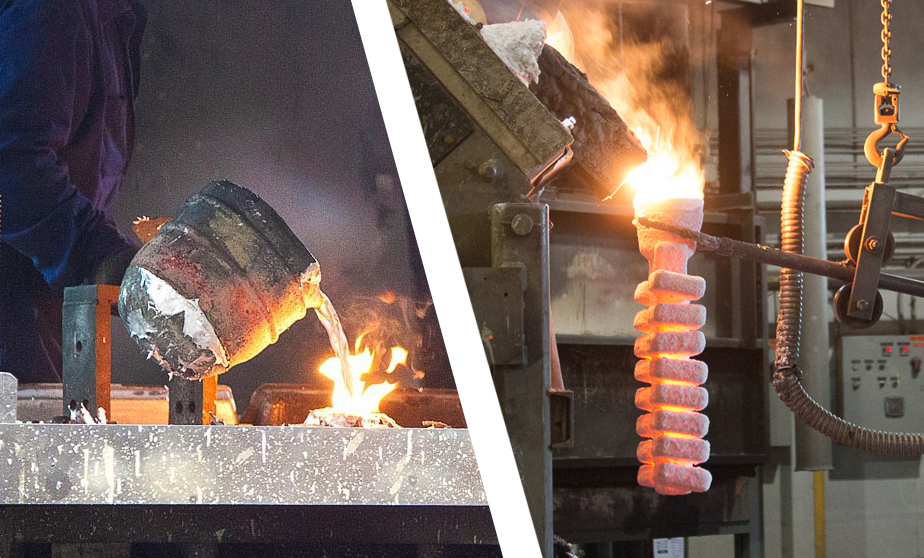Stahl Specialty Company Fundamentals Explained
Stahl Specialty Company Fundamentals Explained
Blog Article
The Facts About Stahl Specialty Company Uncovered
Table of ContentsSome Known Incorrect Statements About Stahl Specialty Company Some Known Questions About Stahl Specialty Company.Getting My Stahl Specialty Company To WorkStahl Specialty Company Things To Know Before You BuyThe Best Guide To Stahl Specialty Company
There are lots of minor differences between functioned and cast aluminum alloys, such as that cast alloys can contain a lot more significant amounts of other metals than wrought alloys. The most noteworthy difference in between these alloys is the fabrication procedure with which they will go to provide the final item. In addition to some surface therapies, cast alloys will leave their mold and mildew in virtually the exact strong form preferred, whereas functioned alloys will undertake numerous modifications while in their solid state.If you believe that a functioned alloy may be the very best for your task, have a look at several of our short articles that describe more concerning certain wrought alloys, such as Alloy 6061 and Alloy 6063. On the various other hand, if you believe a cast alloy would be better for you, you can learn more concerning some cast alloys in our Alloy 380 and Alloy 383 articles (coming soon).

Having the experience and sector knowledge to craft your spreadings for optimum manufacturing and top quality results will enhance the job. Making light weight aluminum castings requires a complicated collection of processes to accomplish the best results. When picking a new aluminum shop to partner with, ensure they have comprehensive sector experience and are experienced regarding all elements of the aluminum casting process: layout, manufacturing, product evaluation, and item screening.
The Buzz on Stahl Specialty Company
The shop should additionally have a tested performance history of supplying phenomenal products that meet or go beyond customer assumptions. Quality assurance must additionally be at the top of your list when picking an aluminum foundry. By collaborating with a certified foundry that complies with the criteria for quality assurance, you can protect the integrity of your item and guarantee it satisfies your specifications.
By selecting a firm that uses services that fulfill or exceed your product demands, you can be certain that your task will certainly be finished with the utmost precision and effectiveness. Different components call for various manufacturing techniques to cast aluminum, such as sand casting or die casting.

Die spreading is the name given to the process of producing complicated steel elements through use of mold and mildews of the part, additionally recognized as dies. It creates more components than any other process, with a high degree of precision and repeatability. There are 3 sub-processes that fall under the category of die casting: gravity pass away casting (or permanent mold and mildew casting), low-pressure die casting and high-pressure die casting.
After the pureness of the alloy is checked, dies are created. To prepare the passes away for casting, it is vital that the passes away are clean, so that no deposit from previous productions remain.
The pure steel, also called ingot, is contributed to the heater and maintained the molten temperature level of the steel, which is then transferred to the injection chamber and infused right into the die. The pressure is then kept as the steel strengthens - aluminum metal casting. Once the metal strengthens, the cooling procedure starts
The thicker the wall of the component, the longer the cooling time due to the quantity of interior metal that additionally requires to cool down. After the component is completely cooled, the die cuts in half open and an ejection system pushes the part out. Adhering to the ejection, the die is shut for the next shot cycle.
The 3-Minute Rule for Stahl Specialty Company

Today, top makers make use of x-ray screening to see the entire inside of components without reducing into them. To get to the ended up item, there are 3 key alloys used as die spreading product to select from: zinc, light weight aluminum and magnesium.
Zinc is one of the most pre-owned alloys for die spreading due to its reduced cost of raw materials. Its deterioration resistance likewise permits the components to be lengthy long-term, and it is one of the much more castable alloys due to its lower melting point - Foundries in Missouri.
Examine This Report on Stahl Specialty Company
As pointed out, this alloy is just one of one of the most frequently made use of, yet produces will, sometimes, pick light weight aluminum over zinc as a result of light weight aluminum's production advantages. Aluminum is very cost-effective and one of the extra flexible alloys. Light weight aluminum is utilized for a over here variety of various products and markets anything from home window structures to aerospace products.
Report this page